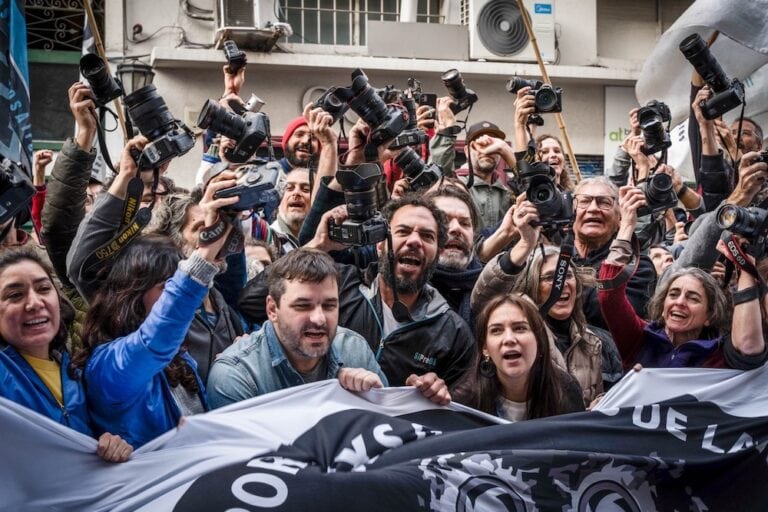(FOPEA /IFEX) – The following is an abridged version of a 22 April 2008 FOPEA letter to President Cristina Fernández de Kirchner: President Cristina Fernández de Kirchner FOPEA, an organisation of 220 journalists from across the country who are interested in the ethics, quality standards and right to freedom of the press, wishes to share […]
(FOPEA /IFEX) – The following is an abridged version of a 22 April 2008 FOPEA letter to President Cristina Fernández de Kirchner:
President Cristina Fernández de Kirchner
FOPEA, an organisation of 220 journalists from across the country who are interested in the ethics, quality standards and right to freedom of the press, wishes to share with you our concerns regarding issues affecting the exercising of our profession and the right to information. For this purpose, we would be grateful if you granted us an audience to discuss the matters detailed below and to analyse the actions the government could take to strengthen the democratic framework in which journalism is carried out.
These are the topics we would like to analyse with you:
– The lack of press conferences at which national officials can be questioned: This way of operating, which began under former president Néstor Kirchner, deprives journalists of valuable information to communicate to society. A basic premise of democracy is that all citizens have a right to information; this right, it appears, is being violated (. . .)
– The repeated pressures from different government offices on journalists and media outlets when undertaking their information-gathering work. We observe with concern that a curt tone, from the highest institutional levels – in addition to indiscriminate criticisms and occasional allusions that are remarkably unfair, such as the recent comment about artist Hermengildo Sábat – do not contribute to the dialogue needed in a democracy. These direct criticisms of journalists, both in public and in private, are echoed in the provincial areas of the country, where they may lead to serious problems if the journalist alluded to is less known and consequently more vulnerable.
– The scope of the re-launched Observatory on Discrimination in Radio and Television (Observatorio de la Discriminación en Radio y Televisión): The possibility that this entity may become a source of pressure or of attempts to discredit or censor certain media outlets or journalists who do not reflect the image the government would like to have, is worrisome. As an organisation that promotes criticism and the study of journalism procedures, FOPEA does not object to the creation of media observatories that assess coverage, but we believe that they must be composed of members of academic institutions, civil society organisations and/or journalists themselves. As well, monitoring by such an observatory must be done without prejudice, using objective criteria, rigorous methodologies, transparency and pluralism, and all media, both public and private, should be subject to such scrutiny.
– The need for a law regulating the allocation of government publicity contracts: This indispensable tool must prevent arbitrariness when information on government decisions and matters of common interest is disseminated, establishing clear and transparent criteria for the distribution of publicity contracts, in order to prevent the contracts from being “carrots and sticks” negatively affecting journalists’ independence.
– Openness to discuss and seek consensus about a new radio broadcasting law: Such a law should protect freedom of expression, citizens’ right to information, and cultural diversity, as well as promote a multiplicity of media outlets and contribute to making the generation of information and access to it more democratic. It should also prevent monopolies from arising and dismantle those already existing, as well as regulating and making more transparent media ownership. All of these principles would be contradicted by any legislative reform that promotes new media hegemonies favouring particular groups or non-pluralistic interests.
– In relation to the preceding point, a regulatory framework for publicly-owned media outlets is essential. The absence of a democratic system of publicly-owned media outlets has allowed, over the years, the most damaging experiments, promoted by those wishing to engage in propaganda, to take place. We believe that state-owned media must be supervised by a body independent of the government, in order to effectively guarantee that they serve the public interest.
– The need for there to be no discrimination in facilitating the press’s work within Argentina or overseas. A public and transparent system for assigning spots on the presidential airplane during overseas tours must be established.
– Congress should reinitiate the debate on an access to public information law. Such a law should be in accordance with the parameters established by our Constitution and international norms, as was the proposal signed by various civil society organisations, including FOPEA.
FOPEA members are convinced of the value of self-criticism, the correction of erroneous attitudes and strict adherence to ethical norms. These are the ideal ways to improve the quality of our work and better serve society. As an unavoidable complement, the State should implement a communications policy based on unrestricted respect for the right to information, as befits a democracy in existence for over 25 years.
We await your response, thank you for your time and send you cordial greetings.
Gabriel Michi
President
For further information on the Sábat case, see: http://ifex.org/en/content/view/full/92509


